Course:FNH200/Assignments/2021/Sweetened vs Unsweetened Superior Natural Soy Drink
Introduction
Soy drink is one of the most popular Asian drinks that has been consumed as a staple for thousands of years in many households. Their rich nutritional composition makes them a great substitution for dairy products[1] and an excellent pairing to many traditional cuisines like Youtiao and common foods such as cereal and oatmeal. As a team, we have selected Superior Natural’s sweetened and unsweetened soy drinks to assess the differences in their nutritional values and taste. This assignment aims to identify the roles of fat and sugar substitutes and other additives found in the ingredient lists and discuss the similarities and differences between the two drinks. The product labelings will also be reviewed to determine whether their provided information meets the regulatory requirements listed in Canada.
Pictures (Sweetened & Unsweetened Soy Drink)
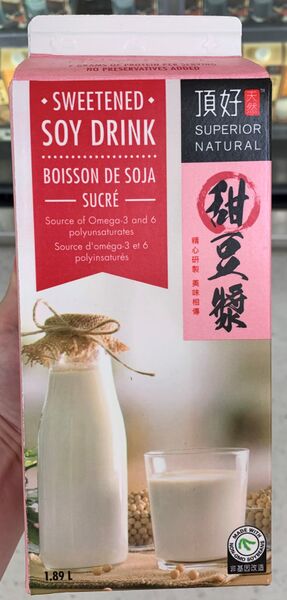


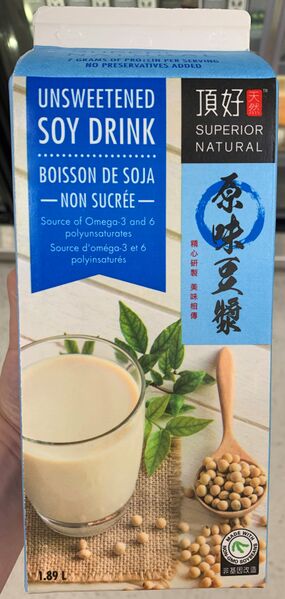

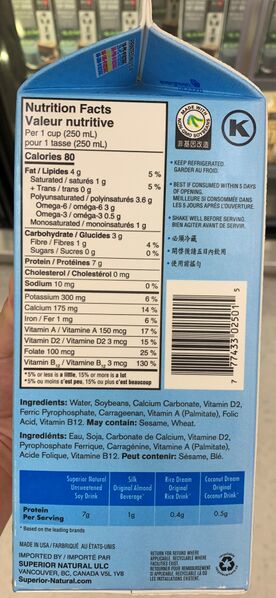

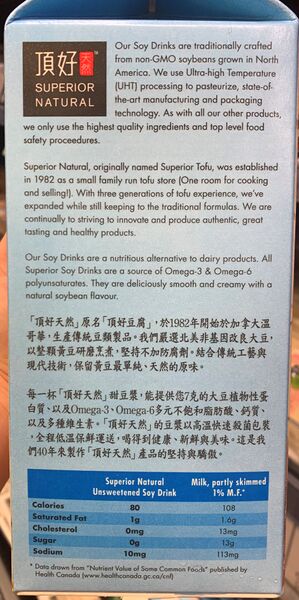
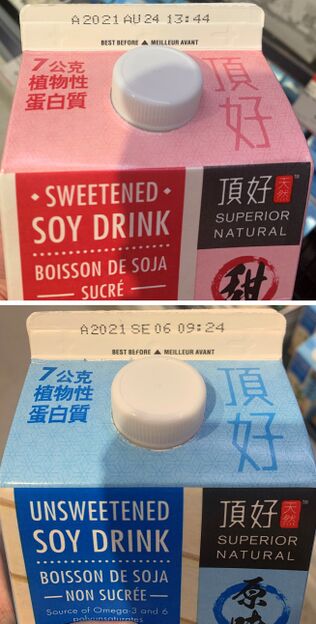
Ingredient Lists
| Product | Sweetened Soy Drink | Unsweetened Soy Drink |
|---|---|---|
| Ingredients: |
|
|
| Products | Fat Substitutes | Sugar Substitutes | Additives Used |
|---|---|---|---|
| Sweetened Soy Drink | Carrageenan | Cane Sugar (used as a sweetening agent) | Calcium Carbonate, Vitamin D2, Ferric Pyrophosphate, Vitamin A (Palmitate), Folic Acid, Vitamin B12 |
| Unsweetened Soy Drink | Carrageenan | None | Calcium Carbonate, Vitamin D2, Ferric Pyrophosphate, Vitamin A (Palmitate), Folic Acid, Vitamin B12 |
Role of Fat Substitutes, Sugar Substitutes, and Additive
A. Fat Substitutes
As an increased number of consumers demand less fat and sugar in their processed diets, along with healthier food alternatives, the food industry has fashioned food products with considerably less fat and calorie-intake. The food industry markets fat substitutes as "healthier" alternatives, leading to a decrease in fat intake present in the population's diet. Fat substitutes are able to successfully mimic the qualities of fat, by maintaining functional properties (such as texture and mouth feel), retaining moisture, thickening, gelling and stabilizing foods.[2] In Superior Natural Soy Drink, carrageenan is added to the unsweetened and sweetened cartons. Derived from a species of red seaweed known as Irish Moss, it is often used as a thickener, emulsifier, gelling agent, and preservative in the food industry. They further contribute to the overall viscosity of the soy drink. It is also a common ingredient in nut milks, meat products and yogurt.[3]
B. Sugar Substitutes
Sugar substitutes, similar to fat substitutes, contribute to a lower calorie, healthier food alternative. In Superior Natural Sweetened Soy Drink, cane sugar is used as a sweetening agent. For individuals with calorie and sugar-related health problems, sweeteners are often the preferred method of sweetening.[4] The soy drink product does not utilize sweeteners such as aspartame, sucralose, sorbitol or maltitol.
C. Additives
Superior Natural Sweetened Sweetened and Unsweetened Soy Drinks offer the same additives. However, under Canadian jurisdiction and regulations, nutritive materials and vitamins are not included as additives.[5] In other words, the listed ingredients of Calcium Carbonate, Ferric Pyrophosphate, Vitamin D2, Vitamin A (Palmitate), Folic Acid, and Vitamin B12 would not be considered as additives in Canada despite their enhancement in the beverages' nutritional value.
Comparison of Alternative Product Offerings
In comparison of the Unsweetened and Sweetened options of Superior Natural Soy Drink, the clearest difference is the addition of cane sugar as a sweetening agent. The Unsweetened Soy Drink lacks a sweetener or sugar substitute. The fat substitute, carrageenan, is present in both cartons, as are the additional ingredients.
Labels
Sweetened Soy Drink:
The front label showcases a picture of the product poured into a glass cup and container. This may be a marketing method to make the appearance of the soy drink to be fresh and natural to the consumer perspective. They also display the common name of the soy drink in large font, so it is easy to identify in both French and English. Below its name, it is added that it is a source of Omega 3 and 6 polyunsaturates which further accentuates the health benefits that the label is conveying with the imagery. On the lower right side, a sticker certifies that it is made with non-genetically modified (GMO) soybeans, which also endorses that this is a healthy drink to consume.
The side of the carton exhibits a chart comparing the amount of protein present in Superior Natural Sweetened Soy Drink compared to other leading brands. The Sweetened Soy Drink contains 7 grams of protein, while the other brands carry 1 gram or less of protein.
The bottom of the back of the carton displays a chart, demonstrating the differences in calories and other nutritional facts between the Sweetened Soy Drink and partly skimmed milk. The Superior Natural Sweetened Soy Drink contains 140 grams of calories compared to 108 grams in 1% milk. However, this is the only aspect of the soy drink that is greater in quantity than partly skimmed milk. According to the label, there is 0.6 grams less saturated fat, 0 cholesterol, 103 milligrams less sodium, and 13 micrograms less Vitamin A present in the soy drink compared to partly skimmed milk.
Unsweetened Soy Drink:
The front label also shows an image of the soy drink poured into a glass cup with leaves behind it and a spoon full of soybeans to the right. This image also represents the simplicity or purity of the drink and freshness to the consumer perspective. The labeling is very similar to that of the sweetened soy drink beyond the product image. The common name is big and bold in French and English, with the added health benefits of Omega 3 and 6 polyunsaturates below it. The label also has the certification sticker of being produced with non-GMO soybeans producing the beverage, which again enforces their health benefits and purity to the consumer.
The side of the carton exhibits a chart comparing the amount of protein present in Superior Natural Unsweetened Soy Drink compared to other leading brands. The Unsweetened Soy Drink, similar to the Sweetened alternative, contains 7 grams of protein, while the other brands carry 1 gram or less of protein.
The bottom of the back of this carton also displays a chart, demonstrating the differences in calories and other nutritional facts between the Unsweetened Soy Drink and partly skimmed milk. The unsweetened alternative of Superior Natural's Soy Drink contains 28 less calories than 1% milk. There is also 0.6 grams less saturated fat, 0 cholesterol, and 103 grams less sodium when compared to 1% milk. These specific differences are similar to the Sweetened Soy Drink. However, there is no sugar present in the unsweetened alternative, while partly skimmed milk contains 13 grams.
| Food Labelling Requirements | Superior Natural Sweetened Soy Drink | Superior Natural Unsweetened Soy Drink |
|---|---|---|
| Bilingual Labelling | Contain 2 official languages of Canada (English + French) plus the addition of Chinese | Contain 2 official languages of Canada (English + French) plus the addition of Chinese |
| Common Name of the Product | Soy Drink/ Soy Milk* | Soy Drink/ Soy Milk* |
| Country of Origin | Made in USA | Made in USA |
| Date Marking |
|
|
| Storage Instruction |
|
|
| Identity and Principle Place of Business | SUPERIOR NATURAL ULC
Vancouver, BC, Canada V5L 1V8 |
SUPERIOR NATURAL ULC
Vancouver, BC, Canada V5L 1V8 |
| Irradiated Foods | Not applicable to the particular brand of soy drink | Not applicable to the particular brand of soy drink |
| Legibility and Location |
|
|
| List of Ingredients and Allergens | Clearly labelled on the products and indicated in descending order by amount | Clearly labelled on the products and indicated in descending order by amount |
| Nutrition Facts Table | Nutrition facts are listed per 1 cup (250mL) serving. The facts indicate Calories, Fats, Carbohydrate, Protein, Cholesterol, Sodium per serving. Amounts of Potassium, Calcium, Iron, Vitamin A, Vitamin D2, Folate, Vitamin B12 are listed at the bottom of the nutrition facts label. | Nutrition facts are listed per 1 cup (250mL) serving. The facts indicate Calories, Fats, Carbohydrate, Protein, Cholesterol, Sodium per serving. Amounts of Potassium, Calcium, Iron, Vitamin A, Vitamin D2, Folate, Vitamin B12 are listed at the bottom of the nutrition facts label. |
| Net Quantity of Product | 1.89 L | 1.89 L |
| Sweeteners | Contains cane sugar listed on the ingredients list | Not Present (no sweeteners added) |
| Other Mandatory Information | Emphasis of Vitamin A content in referencing data from "Nutrient Value of Some Common Foods" published by Health Canada | Emphasis on zero sugar content (as a unsweetened product) in referencing data from "Nutrient Value of Some Common Foods" published by Health Canada |
| Other Claims | With emphasis on the product's packaging label
|
With emphasis on the product's packaging label
|
Note*: Canadian labelling regulations inhibits non-dairy products to be labeled as milk on their packaging[7].
Additional Information
Superior Natural (superior-natural.com)
In relation to soy drinks, the company also offers 2 additional type (Black Sesame and Reduced Sugar High Fibre Soy Drinks) which are not specifically analyze in this research
Other than producing soy drinks, the company also offers a variety of different products ranging from tofu, fried bean curd roll and soy dessert.
References
| This Food Science resource was created by Course:FNH200. |
- ↑ Simson, Rachel (2021). "What is the best alternative to milk?". Roswell Park Comprehensive Cancer Center.
- ↑ Wylie-Rosett, Judith (2002). "Fat Substitutes and Health". Circulation. 105: 2800–2804.
- ↑ Pointer, Kathleen. "Carrageenan: Safety, side effects, and more". Healthline.
- ↑ Government of Canada (2020). "Labelling requirements for sweeteners and foods that contain sweeteners". Government of Canada.
- ↑ Government of Canada (2016). "Food Additives". Government of Canada.
- ↑ Government of Canada (2019). "Food labelling for industry". Government of Canada.
- ↑ Tremblay-Huet, Sabrina (2017). "The Law and Politics of Plant-Based "Milk" Products". Canadian Association for Food Law and Policy.
